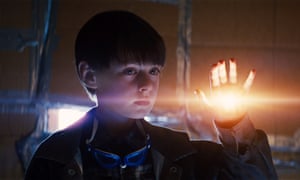
Few things in moviegoing are as pleasurable as finding a young, talented film-maker early on in his or her career, and getting to watch them build, in real time, a distinctive body of work, from debut to sophomore outing, on to first decent, non-independent budget and maybe a first studio outing. If they're lucky (and if we are, too), their worldview and palate will prove strong enough to resist new pressures of the money-based kind and rich enough to grow and deepen as the film-maker develops. And this isn't a thrill confined to some mythical vanished golden age. You can do it right now. People like Rian Johnson, Ben Wheatley, Duncan Jones, Sarah Polley and Jeremy Saulnier offer us the chance to witness young film-makers in steady and confident development.
Likewise Jeff Nichols. Since his intriguing debut Shotgun Stories, he has built – usually with actor Michael Shannon playing Von Sydow to his Bergman – a series of modest but intelligent films that feel rooted in the real American south and deeply ambiguous at the same time; stories that are by turn mythic or mystical, fully realistic or tinged with science fiction. Like his second feature, Take Shelter, Midnight Special is grounded in a mundane and clearly defined reality that the director slowly but thoroughly undermines.
Midnight Special opens like a classic crime thriller: a missing-child alert on local TV news describes two men and a boy, who then appear before us in a grimy motel room, their behaviour contradicting the idea that the boy has been abducted. Time to move, says one (Shannon), the boy's father. They board a car and hit an unlit backroad. The driver (Joel Edgerton) dons night-vision goggles, turns off the car lights and roars away in a furious burst of acceleration – cue title card.
It feels more like a taut little headlong-flight thriller such as Cohen And Tate than anything else, and Nichols is wise enough to know that the solid establishment of a few comfortable genre certainties will lay the groundwork for the strange places he will later take his story, which I won't spoil here.
What makes Nichols' work so watchable is that there is no cheating, no overstatement – he never pushes his luck or tries it on. There is something Spielbergian about his commitment to small characters and well-crafted performances, but he forswears Spielberg's manipulations and sentimentality – real anguish is palpably present here.
The story widens to reveal that father and son are in flight from their religious cult, The Ranch, and now the FBI as well. Having grounded his story in mundanity and plausibility, Nichols is in a position to crank up the weirdness in a measured and graceful manner. In the end, he may not take you to exactly the place you thought you expected or wanted to go, but the qualities of the journey are such that you will be immensely glad you came along for the ride.
References
Source




